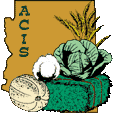 |
|
|
|

|
|||
| |
|||
Weeds can spread by seed, the whole plant or plant parts like tubers or stolens, and over half of the weeds that are common agricultural pests in Arizona have been brought into the state either intentionally or unintentionally. The Federal Noxious Weed Act was passed in 1974 and the Federal Seed Act was approved in 1939 to help control the local, state and national movement of weeds. Arizona has a Arizona also has an The Arizona Crop Improvement Association has been designated as the official seed certifying agency in Arizona. All of the seed that they certify has been tested and is tagged with a label that lists the percent of noxious weed seed in a batch of certified crop seed. Purchasing certified seed insures growers that they are not planting weed seed, and this practice has been very effective. On the other hand, the lists of prohibited, regulated and restricted noxious weeds that are compiled under the state noxious weed law contain many weeds that are common throughout the state. Weeds such as common purslane, burclover, field bindweed, field and southern sandbur and puncturevine are listed as “prohibited” but are widespread throughout the Arizona cropland. Laws that regulate the movement of weeds are well-intentioned and can be effective, but they are difficult to enforce. Practices aimed at preventing weeds from moving into an area and becoming established are probably most effective on a local basis. There are several practices that growers and their pest control advisors can implement in an attempt to keep weeds from invading their fields. To contact Barry Tickes go to: btickes@ag.arizona.edu. |
|||
| Back | |||
For questions or comments on any of the topics please contact Marco Pena at the Yuma Agricultural Center. |
|||
| Home | Cotton
| Veggies | Forages
| Grains | Citrus
| Crop x Crop Insects | Diseases| Weeds | Pesticides | Economics | News | Weather | Research | Photos | Contacts | General Info. Copyright © 2001 University of Arizona, College of Agriculture and Life Sciences Webmaster: Al Fournier (acis@ag.arizona.edu) |
|||